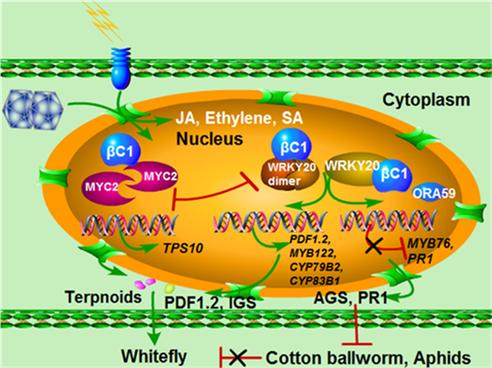Arthropod-transmitted viruses, as known as arbovirus, are causal agents of pandemic diseases in humans, animals, and crops, e.g. Zika virus and cassava geminivirus. These pathogens often alter host characteristics to directly or indirectly influence arthropod vector behaviors or host-herbivore interactions, and are responsible for disease transmission and spread. Pathogens-infected host may promote performance of the vector insects, but whether and how the pathogen affects nonvector insects have been largely unexplored.
A group of scientists led by Prof. JIAN YE from Institute of Microbiology, Chinese Academy of Sciences discovered that viruses mobilize plant immunity to deter nonvector insect herbivores. This study has been published online in Science Advances. (https://advances.sciencemag.org/content/5/8/eaav9801). They have uncovered the mechanism used by begomoviruses (the largest genus of plant viruses in the world) to alter a host plant’s immune system, which may facilitate the development of biological methods to control vector-borne diseases.
Unlike animal viruses, the transmission of plant viruses may have a greater dependence on insect vectors due to the lack of host mobility. Among 1320 plant viruses worldwide, near 80% are transmitted by insect vectors. “At present, the control of plant virus disease almost completely depends on chemical pesticide, so that the ecological and environmental costs are enormous. Previous studies on arbovirus diseases often focused on the interactions of viruses and plant hosts, or viruses and host insects, leading to the lack of effective measures in the viral disease controlling. Our findings provide better effective controlling method for these arbovirus diseases.” said YE.
YE’s team focuses on the research of arbovirus esp. the geminivirus and bunyavirus, causing many notorious crops diseases in developing countries. Both geminivirus and bunyavirus are capable of manipulating the host plant to attract their corresponding vector insects by inhibiting host-derived olfactory cues, in turn promoting pathogen transmission among host plants (http://www.plantcell.org/content/26/12/4991.long; https://journals.plos.org/plospathogens/article?id=10.1371/journal.ppat.1007897).
Whitefly (Bemisia tabaci) species are the only known agricultural super-insect vectors to transmit pathogens and also a major invasive pest of the world. Whitefly can transmits more than 500 plant viruses, including many geminivirus species that have recently emerged as one of the most destructive pathogens in the past decade, particularly in the tropics and subtropics.
To attract more vectors, pathogens are capable of modulating host-derived olfactory cues to deceive their vectors. Prof. Ye’s team found that geminiviruses infection hijacks the function of plant WRKY20 to dramatically reduce the accumulation of specialized metabolites, such as insecticidal glucosinolates, in the vascular tissues where the virus and whitefly feeding on, leading to easier life of geminivirus and whitefly. Meanwhile, the infection of geminivirus redistributes plant insecticidal metabolites among different cell types and cause enhanced glucosinolate levels in non-vascular leaf tissue e.g. messophyll cells. Cotton ballworm dislikes feeding on these geminivirus infected plants. The superior inhibitory effects on cotton ballworm by begomovirus infection were as good as that of a widely used commercial transgenic cotton cultivar engineered to produce insecticidal toxins from Bacillus thuringiensis (Bt). The feeding of another vascular-feeding insect-aphid could activate the production of aspirin-like drug chemical salicylic acid, which in turn inhibits aphids growth and production of offspring. Therefore, these results demonstrate how geminivirus promotes its vector and deters its nonvector competitors in the plant community, partially explaining why geminivirus is so successful worldwide.
In Africa and South Asia, cotton leaf curl virus, one of geminiviruses, causes the major viral disease in cotton with annual loss of millons bales of cotton fiber. As world's largest cotton producer, China yields 30% of total world production every year. This pandemic geminivirus invaded into Southeast Asia and China in the last decade and rapidly established itself in many cotton-growing provinces in China. “It is really critical to identify cotton germplasm that are resistant to whitefly-borne geminivirus since most of high quality fiber cultivars are sensitive to this virus. We are now generating new resistance germplasms by genome editing technology to secure high quality cotton fiber production” said Prof. YE. Their research also provides important ecological insights to predict pathogen invasions for food security of the world.

A working model of begomoviruses manipulating plant immunity to promote performance of vector whitefly but deter non-vector herbivores.
Contact:
Prof. YE Jian
Department of Agricultural Microbiology and Biotechnology,
Institute of Microbiology, Chinese Academy of Sciences,
Beijing 100101
Email: jianye@im.ac.cn